|
|
|
Sort Order |
|
|
|
Items / Page
|
|
|
|
|
|
|
| Srl | Item |
| 1 |
ID:
132793
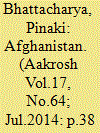

|
|
|
|
|
| Publication |
2014.
|
| Summary/Abstract |
General Boris Gromov, commander of the 40th Army of the Soviet Union, crossed the 'Friendship' bridge linking the Salang Pass on 15 February I989. hack to the motherland. Najibullah. the Afghan president and a Communist protege' of the USSR regime of Mikhail Gorbachev, was ousted from power in April 1992. The intervening three years have a story to tell to the various protagonists of the current Afghan drama being enacted right now as another superpower gets ready to decamp without completing what it set out to do. The Red Army had left in early I989, and its nominee, Najihullah. held on to power for another three years on the strength of the same Afghan army that had desertions, remained fragmented in factional lines - the Parchams and the Khalqis - and was depleted in terms of resources.
|
|
|
|
|
|
|
|
|
|
|
|
|
|
|
|
| 2 |
ID:
133666
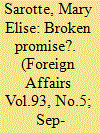

|
|
|
|
|
| Publication |
2014.
|
| Summary/Abstract |
Moscow has long argued that in expanding NATO eastward, Washington broke the promise it made to Soviet leaders shortly after the Berlin wall fell. But new evidence shows that the United States never actually made such a pledge.
|
|
|
|
|
|
|
|
|
|
|
|
|
|
|
|
| 3 |
ID:
127008
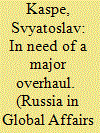

|
|
|
|
|
| Publication |
2013.
|
| Summary/Abstract |
Twenty years after it was established, Russia's post-Soviet political system is still experiencing problems. The system is subject to such disorder and dysfunction that even the most loyal government official cannot help but notice. Russia's political system does not ensure that the objectives for which it was designed can be accomplished. The system's capacity to accumulate resources of various types (material, ideological, and human) and to distribute them is weak and continues to deteriorate, while the system's expenses are exorbitant. Moreover, it is becoming increasingly difficult to control the political system. Public trust in the government and other political structures is very low and the relatively high ratings of individual politicians cannot make up for it. The very same ratings, which in essence form the only bastion of the regime, face the risk of a sudden collapse.
We have almost forgotten that politics should have a value component (the fascination with perestroika proved to be short-lived). The absence of value guidelines beyond accounts of benefits and costs turns politics into a nasty parody of itself and deprives it of power and functionality.
|
|
|
|
|
|
|
|
|
|
|
|
|
|
|
|
| 4 |
ID:
140527


|
|
|
|
|
| Summary/Abstract |
Even now, gazing back through the jaundiced lens of subsequent experience, Barack Obama’s 2008 campaign speech in Berlin still seems an extraordinary occasion. Tens of thousands of mostly young Germans gathered in the center of the city to listen to the American presidential candidate, in an atmosphere The Guardian described as “a pop festival, a summer gathering of peace, love—and loathing of George Bush.” Streets were closed for the occasion. Bands played to warm up the crowd.
|
|
|
|
|
|
|
|
|
|
|
|
|
|
|
|
| 5 |
ID:
128394
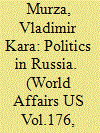

|
|
|
|
|
| Publication |
2014.
|
| Summary/Abstract |
The Kremlin's decision to call a snap election for Moscow mayor in September 2013 may be remembered as a turning point both for Vladimir Putin's regime and for the Russian opposition. For years, the strength of the Putin government has depended not only on its heavy hand but on the lack of an alternative. This vacuum was created and maintained, of course, by the heavy hand itself-shutting down unwanted television channels, disenfranchising (and sometimes jailing) political opponents, and fixing elections. And, for a time, it worked. The shrewdest of Kremlin apologists, both in Russia and abroad, have long ceased to praise the regime, occasionally even admitting its corrupt and repressive nature, but invariably asking, "If not Putin, then who?"
|
|
|
|
|
|
|
|
|
|
|
|
|
|
|
|
| 6 |
ID:
132944
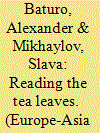

|
|
|
|
|
| Publication |
2014.
|
| Summary/Abstract |
In the absence of public information on the inner workings of the Russian political regime, especially during Medvedev's presidency, outside observers often have to rely on politicians' unguarded comments or subjective analysis. Instead, we turn to quantitative text analysis of political rhetoric. Treating governors as a quasi-expert panel, we argue that policy positions revealed in regional legislative addresses explain how elites perceived the distribution of power between Putin and Medvedev. We find that governors moved from a neutral position in 2009 to a clearly pro-Putin position in 2011, and that policy initiatives advocated by Medvedev all but evaporated from the rhetoric of governors in 2012.
|
|
|
|
|
|
|
|
|
|
|
|
|
|
|
|
| 7 |
ID:
133750


|
|
|
|
|
| Publication |
2014.
|
| Summary/Abstract |
Both the Russian public and its elites were taken by surprise by the fact that Russia has become an immigration country. It has resulted in widespread anti-immigrant sentiments and inconsistency in government actions. Russian immigration politics, as well as immigration politics in liberal democracies of the West, are characterised by a wavering between protectionist and liberal laissez faire approaches. This leads to a mismatch between public rhetoric and legal decisions. However, two features seem to make the Russian situation specific: open borders with most of the countries of the former Soviet Union and omnipresent corruption. Corruption results in a discrepancy between formal (legal) decisions and informal (illegal) practices.
|
|
|
|
|
|
|
|
|
|
|
|
|
|
|
|
| 8 |
ID:
129464
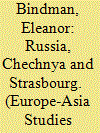

|
|
|
|
|
| Publication |
2013.
|
| Summary/Abstract |
This article explores contemporary Russian official and media discourse on cases concerning human rights violations in Chechnya which have been heard at the European Court of Human Rights. By comparing and contrasting the discourses on the Court's rulings which have been reproduced by various government representatives and various Russian newspapers, the article aims to demonstrate that, while official discourse remains critical of the Court's work with regard to Chechnya, reporting of such cases provides certain media outlets with the opportunity to criticise the government for its perceived failings in relation to safeguarding Chechnya's civilian population from human rights abuses.
|
|
|
|
|
|
|
|
|
|
|
|
|
|
|
|
|
|
|
|
|